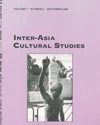Journals

Inter-Asia Cultural Studies: The Asian Sixties Vol. 7 No. 4
| Publication Date | : | Dec / 2006 |
| Publisher | : | Routledge, Taylor & Francis |
This collection in this issue of Inter-Asia Cultural Studies grew out of a double-panel sessionat the Centennial Conference on ‘Asian Horizons: Cities, States and Societies’ sponsored by the Faculty of Arts and Sciences and the Asia Research Institute at the National University of Singapore, held in Singapore in early August 2005. I had been interested for some time in organizing a special issue of Inter-Asia Cultural Studies on the Asian Sixties, and so was very grateful when Chua Beng-huat and Chen Kuan-hsing took the initiative in suggesting this conference as a venue for work on this topic. This issue would not have been possible without their efforts, not only in getting the support of the conference organizers for our panels and securing funding, but in suggesting several contributors and panel members. About half of the essays here were presented as papers in Singapore, and the others were recruited or submitted at, or after, the conference. The double panel and this issue represent the first collection devoted specifically to the Asian Sixties. In the US and Europe, of course, what we might properly term the ‘Western Sixties’ are known simply as ‘the Sixties.’ Despite the worldwide salience of the war in Vietnam and of the Chinese Cultural Revolution in any consideration of the 1960s as a global phenomenon, in much of the world ‘the Sixties’ is still imagined as a western event – many would nominate Paris or Berkeley as the Capital of the World Sixties. Part of the impetus behind this collection was to remedy that perception, to suggest the centrality of Asia in any general consideration of the 1960s, and to put the Asian Sixties on the imaginative map. This has political resonance, of course, and we conceived this special issue as complementing the journal’s Bandung/Third Worldism special issue, edited by Hee-Yeon Cho and Kuan-hsing Chen and published in December 2005. That issue, while recognizing the historical specificity of Bandung and the Third World concept, also looked to that era for inspiration in guiding new regional imaginaries and new counter-hegemonic movements.
Please click here for the contents: http://www.tandfonline.com/loi/raps20/7/4
Author/Speaker:Christopher Connery

